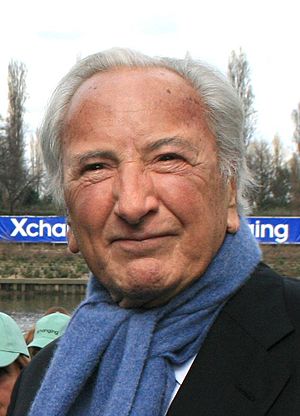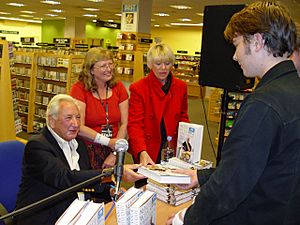Michael Winner facts for kids
Quick facts for kids
Michael Winner
|
|
|---|---|

Winner in 2010
|
|
| Born |
Robert Michael Winner
30 October 1935 Hampstead, London, England
|
| Died | 21 January 2013 (aged 77) Woodland House, Kensington, London, England
|
| Resting place | Willesden Jewish Cemetery |
| Other names | Arnold Crust |
| Alma mater | Downing College, Cambridge |
| Occupation | Film director and producer, screenwriter, film editor, food writer, media personality |
| Years active | 1955–2013 |
| Spouse(s) |
Geraldine Lynton-Edwards
(m. 2011) |
Robert Michael Winner (born October 30, 1935 – died January 21, 2013) was a British filmmaker, writer, and well-known public figure. He was famous for directing many action, thriller, and dark comedy movies in the 1960s, 1970s, and 1980s. He often worked with actors like Oliver Reed and Charles Bronson.
Some of Winner's most famous movies include Death Wish (1974) and its first two sequels. He also directed the World War II comedy Hannibal Brooks (1969), the hitman thriller The Mechanic (1972), and the horror film The Sentinel (1977). Other notable films were The Big Sleep (1978) and the Westerns Lawman (1971) and Chato's Land (1972).
Beyond movies, Michael Winner was a familiar face in the UK. He appeared on TV talk shows and wrote a popular restaurant review column for The Sunday Times. He also helped start the Police Memorial Trust.
Early life and education
Michael Winner was born in Hampstead, London, England. He was the only child of George and Helen Winner. His father was a businessman who ran a clothing store chain.
Winner went to St Christopher School, Letchworth and later studied law and economics at Downing College, Cambridge. While at Cambridge, he became the editor of the university's student newspaper, Varsity. He was the youngest person to hold this position at the time. Even before university, at age 14, Winner wrote a newspaper column called "Michael Winner's Showbiz Gossip." These early jobs allowed him to meet famous film stars like James Stewart and Marlene Dietrich. He also wrote for the New Musical Express music magazine.
Career
Starting in film
Michael Winner began his film career by directing short travel films. His first was This is Belgium (1957), which his father helped pay for. He also wrote, produced, and directed another short film called The Square (1957).
Winner's first credit on a full-length movie was as a writer for Man with a Gun (1958). He then directed more short films like Danger, Women at Work (1959) and Watch the Birdie (1959).
Early British feature films
Winner's first full-length movie as a director was Shoot to Kill (1960), which he also wrote. He followed this with Climb Up the Wall (1960).
His third feature film was the thriller Murder on the Campus (1961). Winner wrote and helped produce this movie. He found success with the musical film Play It Cool (1962), starring Billy Fury. This film was quite popular.
Winner also directed The Cool Mikado (1963), a modern version of the classic The Mikado. His first major project was West 11 (1963), a realistic story about people living in London.
Working with Oliver Reed
Winner's film The System (1964) marked the start of a long partnership with actor Oliver Reed. They made six films together over 25 years. Winner then directed the comedy You Must Be Joking! (1965).
Winner and Reed reunited for The Jokers (1967), a comedy that was a big hit. They also made the comedy-drama I'll Never Forget What's'isname (1967), which also starred Orson Welles. Their fourth film together was the World War II comedy Hannibal Brooks (1969).
Winner also directed The Games (1970), a film about the Olympic Games.
Moving to American films
Hannibal Brooks helped Winner get noticed in Hollywood. He soon directed his first American film, the Western Lawman (1971), starring Burt Lancaster and Robert Duvall.
Back in England, Winner directed Marlon Brando in The Nightcomers (1971). For many of his films, Winner was also the editor, using the name 'Arnold Crust'.
Working with Charles Bronson
Winner worked with actor Charles Bronson on several films. Their first was Chato's Land (1972), a Western about a mixed-race Native American. Winner also edited and produced this film. Their second film together was The Mechanic (1972), a thriller about professional assassins.
The following year, Winner directed Lancaster again in the spy drama Scorpio (1973). He also directed a third film with Bronson, The Stone Killer (1973).
Death Wish
Winner and Bronson's most famous collaboration was Death Wish (1974). This film became very well-known and was one of the highest-earning movies of the year. It also shaped the careers of both Winner and Bronson.
Other films
After Death Wish, Winner tried directing different types of films. He made Won Ton Ton, the Dog Who Saved Hollywood (1976), a comedy about an animal. He also directed the horror film The Sentinel (1977).
Winner then wrote, produced, and directed a new version of the detective story The Big Sleep (1978), starring Robert Mitchum. He also directed the crime thriller Firepower (1979), which starred Sophia Loren and James Coburn.
Reunion with Bronson
In the early 1980s, Winner needed a successful film. He agreed to direct Death Wish II (1981), a sequel to their earlier hit, after Charles Bronson asked him to. This sequel was very successful and earned a lot of money.
The success of Death Wish II allowed Winner to make a dream project: a 1983 remake of the film The Wicked Lady, starring Faye Dunaway. Winner wrote, produced, and directed this movie.
Winner reunited with Bronson for Death Wish 3 (1985). Although the movie was set in New York City, much of it was filmed in London to save money.
Winner's last film for Cannon Films was an adaptation of the Agatha Christie novel Appointment with Death (1989), starring Peter Ustinov. Despite a strong cast, the film was not a success.
Final British films
After Cannon Films went out of business, Winner focused on British movies. He produced and directed A Chorus of Disapproval (1989), starring Anthony Hopkins.
Winner also produced, directed, and edited the comedy Bullseye! (1990), starring Michael Caine and Roger Moore. The film was not well-received by critics. Later, he wrote, produced, and directed Dirty Weekend (1993).
Winner's last film as a director was Parting Shots (1999). This film was also not well-received and did not do well at the box office.
Other activities
Michael Winner was a regular guest on BBC Radio 4's Any Questions and appeared on TV shows like Question Time and Have I Got News for You. He also wrote a column for the Daily Mail newspaper. His autobiography, Winner Takes All: A Life of Sorts, was published in 2006.
Winner was also famous for his TV commercials for an insurance company, esure. In these ads, he used his famous catchphrase, 'Calm down, dear! It's just a commercial!'
He was featured on the TV show This Is Your Life in 2001. Winner also appeared in the first series of The Apprentice UK for a charity event.
Personal life
Michael Winner married Geraldine Lynton-Edwards on September 19, 2011, in London. They had first met in 1957. Michael Caine and his wife, Shakira Caine, were witnesses at their wedding.
Winner lived in a large house called Woodland House in Holland Park, London. He had planned to turn his house into a museum after his death, but this plan did not work out.
In 2007, Winner became very ill after eating an oyster in Barbados. He caught a serious bacterial infection and almost lost a leg. He also got a hospital infection called MRSA. In 2011, he was hospitalized again with food poisoning.
Police Memorial Trust
Winner was very supportive of police officers. In 1984, he started the Police Memorial Trust. This trust has put up many memorials across the UK to honor police officers who died while doing their duty. The National Police Memorial in London was unveiled by Queen Elizabeth II in 2005.
In 2006, Winner was offered an award called an OBE for his work with the Police Memorial Trust, but he turned it down. He later said he also turned down a knighthood.
Winner's Dinners
Winner was also well-known for his strong opinions on restaurants. He wrote a column called "Winner's Dinners" for The Sunday Times for over twenty years. In December 2012, he announced he would stop writing his column due to poor health.
Interests and hobbies
Michael Winner was an art collector. He collected works by famous illustrators like Edmund Dulac, Arthur Rackham, and Beatrix Potter. He also enjoyed gardening, sometimes even after midnight. He said his life hadn't changed much over the years, still enjoying dates, making films, and writing.
Death
In October 2012, Michael Winner shared that doctors had told him he had about 18 months to two years to live. He died at his home in Holland Park on January 21, 2013, at the age of 77. Winner was buried after a traditional Jewish funeral at Willesden Jewish Cemetery.
Filmography
(from 1967 also producer)
Short films
- The Square (1956)
- This is Belgium (1956)
- Man with a Gun (1958)
- It's Magic (1958)
- Danger, Women at Work (1959)
- Floating Fortress (1959) (associate producer)
- Girls, Girls, Girls! (1961) (directed and written by)
- Haunted England (1961)
- Behave Yourself (1962)
Feature films
- Climb Up the Wall (1960)
- Shoot to Kill (1960)
- Some Like It Cool (1961)
- Old Mac (1961)
- Out of the Shadow (1961)
- Play It Cool (1962)
- The Cool Mikado (1963)
- West 11 (1963)
- The System (1964)
- You Must Be Joking! (1965)
- The Jokers (1967)
- I'll Never Forget What's'isname (1967)
- Hannibal Brooks (1969)
- The Games (1970)
- Lawman (1971)
- The Nightcomers (1971)
- Chato's Land (1972)
- The Mechanic (1972)
- Scorpio (1973)
- The Stone Killer (1973)
- Death Wish (1974)
- Won Ton Ton, the Dog Who Saved Hollywood (1976)
- The Sentinel (1977)
- The Big Sleep (1978)
- Firepower (1979)
- Death Wish II (1982)
- The Wicked Lady (1983)
- Scream for Help (1984)
- Death Wish 3 (1985)
- Appointment with Death (1988)
- A Chorus of Disapproval (1989)
- Bullseye! (1990)
- Dirty Weekend (1993)
- Parting Shots (1999)
See also
 In Spanish: Michael Winner para niños
In Spanish: Michael Winner para niños
 | John T. Biggers |
 | Thomas Blackshear |
 | Mark Bradford |
 | Beverly Buchanan |


